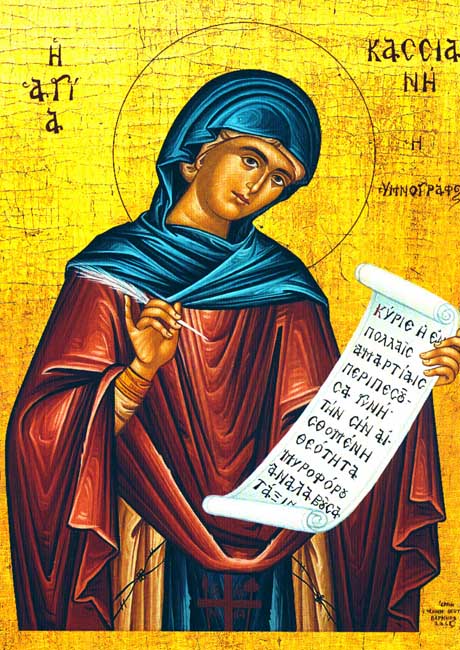Kassia of Constantinople
The Medieval Period
Public domain, via Wikimedia Commons
Kassia was born in Constantinople, at that time the capital of the Roman (Byzantine) Empire. At a young age, she was considered well connected and beautiful enough to be presented at a bride show for marriage to Theophilos, the son of Emperor Michael II.
Michael II had been a general for the previous emperor, Leo V. However, after plotting to overthrow him, Michael was imprisoned for treason and scheduled to be executed on Christmas Day 820. Michael's supporters snuck into the imperial chapel on Christmas Eve disguised as choir members to assassinate Leo. After briefly defending himself with a crucifix, Leo was killed and Michael became emperor.
Theophilos now had to choose a bride to secure the imperial dynasty, presenting the woman of his choice with a golden apple. Prince Theophilos said to Kassia, "Through a woman came the baser things," to which Kassia replied, "And through a woman the greater."
The young prince was not interested in having a witty wife, so he gave the apple to someone else. Kassia instead pursued a religious vocation. By 843, she founded a convent in the western part of Constantinple and served as its abbess. Her convent worked closely with the Stoudion, the most prominent monastery in Constantinople. This is not only is a testament to her influence but ensured the survival of her writings, poems, and musical compositions. Hundreds of poems and fifty of her hymns survive; half of these are still used in Orthodox liturgy.
Her music consists of flowing, beautiful melodies and originally would have been performed in a monophonic style with an ison, characteristic of Byzantine Chant.
When Theophilos became Emperor, he was a fierce iconoclast who found the use of paintings and images in religious worship blasphemous. Kassia held the opposite orthodox view that this was not the case. Her opposition to Theophilos became vocal enough that at one point she was dragged out of the convent and publicly whipped in the streets. However, Kassia never backed down.
There is an anecdote that Theophilos, toward the end of his life, visited Kassia's convent in person. Hearing him approach, she hid in a closet. The emperor found a hymn entitled "Hymn of the Sinful Woman," which she had left unfinished on her desk. He picked up her quill, completing the poem by adding a line about Eve hiding from the footsteps of God in the Garden of Eden.
